Carl E. Olson's Blog, page 128
October 8, 2013
Space For Awe and Gratitude: A Review of "Gravity"

A still from the movie, "Gravity".
Space For Awe and Gratitude: A Review of "Gravity" | Nick Olszyk | CWR
Alfonso Cuarón’s "Gravity" has moments of profound beauty, intense fear, and transcendent awareness
MPAA Rating, PG-13
USCCB Rating, A-III
Reel Rating:




 (5 Reels out of 5)
(5 Reels out of 5)
[Editor's note: Alert!
Spoilers ahead!]
Space is empty, void of matter, energy, heat,
and any chance of survival for the smallest bacteria, much less a
human being. It is a testament to human ingenuity that, since 1961,
explorers have been entering and even living in this vast and silent
wasteland. Director Alfonso Cuarón’s Gravity is a soaring
witness to these feats, an excellent thriller that revels in the
ferocity of nature, the power of prayer, and the triumph of man as
image of the Creator. In an Icarian age, Gravity is an
important reminder that despite centuries of technology, all are
still in the hands of God, and that is a good thing they are the
hands of a loving Father.
In classic Cuarón style,
the first fifteen minutes of Gravity is a single,
uninterrupted take that weaves seamlessly between engineer Dr. Ryan
Stone (Sandra Bullock) and NASA astronaut Matt Kowalski (George
Clooney) as they repair the Hubble telescope 600km above the surface
of the Earth. It’s a breathtaking sequence that rivals any in
cinematic history as the audience sees the immensity of the planet
and outer space juxtaposed with close-ups of the scientists chatting
casually like car mechanics.
This is Stone’s first
trip, and she is nervous and undisciplined. Kowalski is just hours
from breaking the record for spacewalk duration and moves around
easily, as if he was trimming his own backyard. Suddenly, debris from
a satellite crash rips through their shuttle leaving them stranded in
space. It is violent and terrifying, especially since it happens
without any sound save for the heightened pace of Stone gasping for
air and the nerve-racking radio communications between her and
Kowalski.
Miraculously, the two
survive, but their shuttle is destroyed. They must maneuver over to
the International Space Station's damaged escape pod, not to escape
but use it to reach the Chinese station, which does have a functional
return capsule.
20% off gripping novels from Ignatius Press!

Offer ends Tuesday October 15th, 2013 at 12:00 midnight EST.
These prices are available online only through Ignatius.com
20% off gripping novels from Ignatius Press!

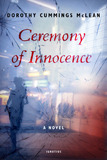 Ceremony of Innocence: A Novel
Ceremony of Innocence: A Novel
Dorothy Cummings McLean
Riots. Terrorist attacks. Neo-Nazi violence.
In
modern-day Germany, journalist Catriona McClelland has seen it all
while covering the contemporary European scene for a Catholic news
organization. Keeping herself above the political fray in her
professional life, she has also managed to keep herself from personal
entanglements-still hurt from the wounds of a broken relationship.
Things come to a head when her boyfriend Dennis, frustrated with a lack
of commitment, leaves her for Suzy Davis, an idealistic young Canadian
who is involved with a left-wing protest movement. But when Suzy is
murdered... who is complicit and who is innocent?
Ripped from the headlines, Ceremony of Innocence is a very
contemporary novel of Europe on the edge of social breakdown. Train
stations are bombed and migrants targeted for violence as journalists
and other tastemakers watch from their positions of privilege.
Dorothy Cummings McLean's realistic narrative does not describe the
feats of heroes. Rather, it unnervingly lays bare the way religious
faith and moral reasoning can be easily manipulated and compromised. Also available as an e-book.
Regular price: $19.95, sale price: $15.96

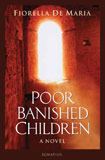 Poor Banished Children: A Novel
Poor Banished Children: A Novel
Fiorella de Maria Nash
Poor Banished Children is the tale of one woman's
relentless search for freedom and redemption. The historical novel
raises challenging questions about the nature of courage, free will, and
ultimately salvation.
- An award-winning European novelist presents a powerful story of mystery, adventure, peril, suffering, faith, and courage
- A thrilling historical novel that explores the life and cultures of 17th century England, Malta and Africa
- A challenging work that tells the story of one woman's relentless
search for freedom and redemption amidst great suffering, loneliness and
despair Also available as an audio download and e-book.
Regular price: $16.95, sale price: $13.56

 Do No Harm: A Novel
Do No Harm: A Novel
Fiorella de Maria Nash
When a British emergency room doctor saves the life a woman who
apparently attempted suicide, he is accused of committing a crime and
stands trial. Not only is Dr. Matthew Kemble's medical practice at risk,
but also his liberty. If he is found guilty of trespassing on a woman's
right to die, he could go to jail.
Set
in and around London, the story explores the interrelated stories of a
physician facing ruin and imprisonment at the height of his career, his
old friend and doggedly determined lawyer, Jonathan Kirkpatrick, and
Maria, a passionate, dedicated but intensely lonely young campaigner who
while working for the defense proves incapable of staying out of
trouble herself. Also available as an e-book.
Regular price: $19.95, sale price: $15.96

 Terrapin: A Mystery
Terrapin: A Mystery
T. M. Doran
Dennis Cole and his three best buddies from childhood gather for a
weekend reunion. On the first night, one of the men is murdered-or is
he?
A
professor of engineering by day and a writer of detective fiction by
night, Cole and the other survivors try to piece together the mysterious
fate of their friend. The suspenseful story moves back and forth
between the unfolding reunion gone bad and childhood events that
involved these friends who grew up on the same street.
A murder mystery and a coming of age story, both with many twists and turns, Terrapin
is about man's potential for doing either good or evil, his tendency to
do the latter, and his response to the consequences of his actions. Also available as an e-book.
Regular price: $19.95, sale price: $15.96

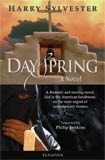 Dayspring: A Novel
Dayspring: A Novel
Harry Sylvester
Spencer Bain is a modern man of science, a university
anthropologist doing fieldwork in a small New Mexican town. Used to long
separations from his wife, a UCLA professor equally dedicated to her
career, he is mostly untroubled by his infidelities, and hers; that is,
until now.
In
order to study the religious practices of the Penitentes, a brotherhood
of local men who engage in severe, medieval penances, Bain feigns a
conversion to Catholicism and participates in their Lenten observances,
including their dramatic public procession on Good Friday.
Nothing
in Bain’s skeptical academic training has prepared him for the profound
remorse that he begins to experience. Though no sentimentalist with
respect to the poor and ignorant who surround him, he cannot help but
contrast the simple yet solid lives of the men and women he studies with
his own fruitless relationships and those of the jaded, over-sexed
sophisticates — the self-proclaimed artists and intellectuals — he
considers his peers. Also available as an audio download and e-book.
Regular price: $15.95, sale price: $12.76

 Island of the World: A Novel
Island of the World: A Novel
Michael O'Brien
Island of the World is the story of a child born in 1933
into the turbulent world of the Balkans and tracing his life into the
third millennium. The central character is Josip Lasta, the son of an
impoverished school teacher in a remote village high in the mountains of
the Bosnian interior. As the novel begins, World War II is underway and
the entire region of Yugoslavia is torn by conflicting factions: German
and Italian occupying armies, and the rebel forces that resist them—the
fascist Ustashe, Serb nationalist Chetniks, and Communist Partisans. As
events gather momentum, hell breaks loose, and the young and the
innocent are caught in the path of great evils. Their only remaining
strength is their religious faith and their families.
For
more than a century, the confused and highly inflammatory history of
former Yugoslavia has been the subject of numerous books, many of them
rife with revisionist history and propaganda. The peoples of the Balkans
live on the border of three worlds: the Islamic, the orthodox Slavic
East, and Catholic Europe, and as such they stand in the path of major
world conflicts that are not only geo-political but fundamentally
spiritual. This novel cuts to the core question: how does a person
retain his identity, indeed his humanity, in absolutely dehumanizing
situations? Also available as an audio download and e-book.
Regular price: $24.95, sale price: $19.96

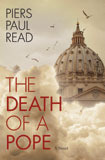 The Death of a Pope: A Novel
The Death of a Pope: A Novel
Piers Paul Read
Juan Uriarte, a handsome and outspoken Spanish ex-priest, seems to
be the model of nonviolence and compassion for the poor and downtrodden.
So why is he on trial, accused of terrorist activities? His worldwide
Catholic charitable outreach program is suspected of being a front for
radicals. The trial is covered by Kate Ramsay, a young British reporter,
who sets out to undercover the truth about Uriarte and his work. She
travels with him to Africa to see his work first hand but soon finds
herself attracted to him.
Meanwhile
an international conspiracy is growing, one that reaches into the
Vatican itself. When the death of Pope John Paul II brings the conclave
that will elect Joseph Ratzinger as Pope Benedict XVI, a terrorist plot
involving blackmail, subterfuge, and mass murder begins to fall into
place... a plot that could spell disaster for the Catholic Church and
the world.
Piers
Paul Read’s powerful tale combines vivid characters, high drama, love,
betrayal, faith, and redemption in a story of intrigue, of church
espionage, and an attempt to destroy the longest continuous government
in the world—the Papacy. The Death of a Pope races toward an unexpected and unforgettable conclusion. Also available as an audio download and e-book.
Regular price: $16.95, sale price: $13.56
October 7, 2013
Excerpts from "The Rosary: Chain of Hope" by Fr. Groeschel

Excerpts from
The Rosary: Chain of Hope | Fr. Benedict Groeschel, C.F.R.
Chapter Six | Prayers for the Mysteries
The following prayers are composed to help you sum up prayerfully what
we have written about the Rosary as a message of hope. Each prayer could
be used for quiet meditation at the beginning of the decade.
The Annunciation
O Lord Jesus Christ, You come to us in mystery and generosity. Your coming
is totally beyond the human mind because You are God, yet You are totally
comprehensible to us because You became an infant child. Thy mysteries
of heaven and earth come together in this little baby. Give us the grace,
O Lord, to kneel in adoration before Your divinity incarnate in this world.
Amen.
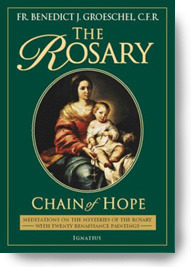
The Visitation
O Lord Jesus Christ, teach us the humility of Your Mother and the humility
that was in Your own life. Humbly, as a gentle country woman, she visits
her cousin to do works of kindness and charity. This meeting may seem
irrelevant to some and its significance obscure. Yet it is really the
beginning of the teaching of Christian charity and love for neighbor.
Amen.
The Nativity
O Lord Jesus Christ, help us to kneel at Your Christmas crib, to look
at that tiny baby and his tiny skull. Underneath that skull human thoughts
are linked to divinity and eternity. This must remain completely incomprehensible
to our minds. Lord Jesus, You are mysterious, incomprehensible, and unfathomable,
but You are also merciful and caring toward all of us. In the mystery
of Your love, O Christ, help us to kneel at the manger, where You were
wrapped in humble clothes and surrounded by animals. Amen.
The Presentation of Christ in the Temple
O Lord Jesus Christ, in this mystery You remind us of the humility of
Joseph and Mary, of the humility expressed by Your own Divine Person in
coming to the temple as one of the poor. Give us the grace to be humble
enough to fulfill our religious duties and not try to escape them by rationalizing
or pseudo-sophistication. Amen.
The Finding of Christ in the Temple
O Lord Jesus Christ, even Your life and Your coming were fraught with
human anxiety and trial. Why should we, as followers of You, expect fewer
trials than others? No, we should expect trials, but we should be able
to overcome them and carry them with greater ease because we believe in
You. Amen.
Commentary by Fr. Groeschel
The First Joyful Mystery
The Annunciation
The events of the Annunciation, as given in the Gospel of Saint Luke,
can be known to us only through the testimony of the Virgin Mary herself
or by inspiration to the evangelists. No one besides Mary was present
at the incredible meeting of the human and divine. This mysterious event
described by Saint Luke in a few lines presents a number of the basic
foundation stones of Christian belief.
The first and obvious fact of the mystery of the Annunciation is that
it is a visitation from a heavenly messenger; something occurs that is
completely from outside the natural world. This event can only be an object
of faith. It is God’s self-revelation in the world. Acceptance of
the Annunciation is the foundation of the Christian faith. The second,
startling truth is that Mary must give her consent to the invitation given
to her. Often in salvation history God has chosen young peasant girls—Ruth
in the Old Testament, Joan of Arc, Catherine Laboure, Therese of Lisieux,
and the children of Fatima. He has chosen these little ones to his witnesses
and instruments for grace in the lives of hundreds of millions of people.
In no event is this clearer than in the life of the Virgin Mary. Her consent
was necessary, and for this reason from the earliest times she has been
called the Mother of the Redeemed, Mother of the Church.
There is no indication that Mary was coerced into accepting God’s
invitation or that she responded out of some religious intuition. As a
humble believing girl from a peasant village, she accepted the word that
the Lord had spoken to her. As we meditate on this first mystery, let
our hearts be filled with hope in the presence of the Incarnate Word,
the Son of God, in the world. He comes to bring salvation to us, to those
dear to us, and to as many human beings as possible. This mystery also
calls us personally to the response necessary for any true disciple of
Christ: We must say Yes to Him. We must give him Him our wholehearted
consent. We must believe the word that the Lord has spoken.
The Second Joyful Mystery
The Visitation
In this mystery we move from the sublime and mysterious aspects of the
Annunciation to its equally mysterious reality in the world. We move from
the transcendent truth of God made man in the Annunciation to a very humble
and touchingly human situation. A young girl goes to visit her older cousin
who has unexpectedly conceived a child. Both of these women live in humble
peasant villages. As we can see from their words, they are both deeply
imbued with the truths of the Jewish faith. They are familiar with Scripture.
And the beautiful expression of Elizabeth, "And blessed is she who
believed that there would be a fulfillment of what was spoken to her from
the Lord" (Lk 1:45), fills us with confidence and hope. The great
events of salvation, like the Incarnation, come now into the smallest
events of human life. The Council of Ephesus proclaimed that it is true
to say that God was born, that God suffered, and that God died. The Second
Person of the Blessed Trinity, by taking to Himself a human body and human
soul, was able to experience human birth and human death. He sanctified
all human things. The love and charity of the two cousins present an image
that almost every human being can meditate on and receive with warmth.
The Lord is coming, but He comes in a humble, gentle, and human way. The
mystery of the ages becomes the joy of two humble women of the countryside
as they rejoice in each other’s pregnancy, as well as in the power
of God made manifest in both of them.


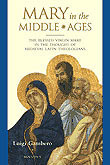



The Third Joyful Mystery
The Nativity
We have become so familiar with the image of the Nativity of Christ, ranging
from great paintings to Christmas decorations, that its incredible reality
is somewhat dimmed for us. We think of Christmas lights, family days,
good meals, and presents. But the Nativity took place in a dangerous situation
among the poorest of the poor. Mary wrapped her newborn baby and placed
Him in a manger—an animals’ feeding trough. In a very short
time he would be a political refugee from the homicidal wrath of an insane
ruler. The Incarnation, as seen from God’s eyes, was a descent into
a turbulent, disobedient, and unredeemed world. The mystery of evil operating
in the human race came right to the fore. It is clearly revealed before
us in the Nativity, in its poverty, its injustice, and its danger. But
at the same time there was tremendous joy. All of creation, on the brink
of redemption, rejoiced with the heavenly host, who appeared to announce
the great news to humble shepherds, who represent the house of Israel.
They heard the message, and they believed; then proceeding "with
haste", they decided to "go over to Bethlehem and see this thing
that has happened" (Lk 2:15). The Magi—representing the Gentile
world—were led by a star to find the Christ. "When they saw
the star, they rejoiced exceedingly with great joy." In other words,
they believed; and seeing "the child with Mary his mother…they
fell down and worshipped him" (Mt 2:10-11). In the difficulties of
human life we must always affirm our belief in the mysteries of God and
the mysteries of Christ. Unfortunately, at the present time, the full
impact of the Incarnation has been eroded by skepticism and rationalistic
attempts to explain away the mystery in both theology and Scripture scholarship.
Kneeling in prayer with the Rosary, however, believers should be unaffected
by all of this and should open their eyes to see this great thing that
has taken place, as the shepherds did in the fields so long ago.
The Fourth Joyful Mystery
The Presentation of Christ in the Temple
The Presentation of the Christ Child in the temple, in fulfillment of
the regulations of the Law of Moses, gives us a beautiful example of the
humility of the Son of God. He teaches us to obey traditions, laws, and
customs. Though He would begin the religion that would end the first covenant
and usher in the second covenant, He nonetheless fulfills the requirement
of the first covenant, which was, after all, an expression of the divine
law. The humble figures of Joseph, Mary, and the Child, who come to make
the poor people’s offering of two turtledoves, the presence of the
elderly Anna and Simeon, both mysterious figures, should banish all skepticism
from our minds and help us to appreciate the little things of faith. If
you do not know the poor and have had little opportunity to share their
religious experience, then this mystery opens up the possibilities of
understanding why Christ taught that it is easier for the poor than for
the rich to enter the kingdom of heaven. The devout poor are willing to
accept humbly and directly, to fulfill carefully and meticulously, what
they know to be the expectations of God.
There is something else to be learned from this event in the temple. It
is the value of simple devotion, of humble and heartfelt reverence for
God. We live in a time when people evaluate religious acts by "how
much we get out of them". In other words, we evaluate them primarily
in a psychological way, and this has led to an endless search for ways
to make worship more appealing and uplifting.
An experience of the profoundly moving customs of different ethnic groups
in the Church, who have their own time-honored traditions, reveals how
deeply expressive they can be—the Holy Week processions in the Spanish-speaking
world or the carolers in Eastern Europe going with candles and bells to
announce the birth of Christ on Christmas Eve.
I remember so well assisting as an altar boy on Sunday mornings long ago
when new mothers received a special blessing at the first Mass they attended
after the birth of a child. It is true there is more dialogue and discussion
at present in the Church, but there is less of the beauty of simple faith,
which we see in Mary and Joseph at the time of the Presentation, when,
along with many other couples, they came to fulfill the law and receive
a blessing.
The Fifth Joyful Mystery
The Finding of Christ in the Temple
In so many depictions of the Holy Family there is an unrealistic idealization
that can become almost repulsive: beautiful carpenter shops, sunny windows,
and the Christ Child dressed in a gold apron helping Joseph at the workbench.
While all of this may have an appeal for children, it is not realistic.
In the last of the joyful mysteries we confront the incomprehensibility
of suffering and the difficulties of human life. Although the finding
of the Christ Child is a cause of great joy, the mystery also reflects
deep sorrow, fear, and parental concern on the part of Joseph and Mary.
It has often been said that God writes straight with crooked lines. This
is true even in the life of Jesus Christ. The parents could have been
spared the pain of this situation by God’s Providence, even by the
thoughtfulness of Christ, but they were not. As we meditate on the desperate
anxiety of the couple looking for their child, we are reminded that for
all of us life has its own mysterious failures, catastrophes, and sorrows.
When we are forlorn and anxious, or perhaps deeply grieved, we need to
remember that such experiences come not only to us, but they also came
to the Messiah and His family.
Anxiety is a familiar component of human life, and perhaps it is more
common now in more affluent times. Material comforts and anxiety inexplicably
go together. One often encounters in the poor a certain acceptance of
life, with its pain and fear. The poor live with inexplicable hope, born
of pain and suffering, that permits them to go on even when disaster has
occurred and threatens to strike again.
We all live through anxious moments, and even very dark moments, when
our worst fears are realized. Mary and Joseph were relieved to find the
Christ Child in the temple. In less than half a lifetime Mary would lose
her son at Calvary in sight of this same temple. This reminds us that
Christianity is very much the religion of the God who suffers.
Hope and Joy
As the joyful mysteries come to an end, they present us with hope unbounded—the
hope of the Redeemer, the hope of divine adoption, the hope of salvation.
They also present us with poignantly human events: Mary’s visit to
her cousin, the Presentation in the temple, and the finding of the Child.
Already the burden of human life—poverty, misunderstandings, human
limitations—is obvious in the life of the Messiah. He is the Son
of God; He is not a superman. The Bible is the way of truth, not a series
of stories like Pollyanna or a set of myths. These events really took
place, and they took place in the lives of real people. Our great hope
is founded on the fact that one of these very real people was also truly
the Son of God and a Divine Person. The message of hope given by the angel—God
is with us, Emmanuel—must reach down to all human beings in their
own personal lives. In the midst of their greatest difficulties and sorrows,
or in the inevitability of age and sickness, they will also have hope
because the Son of God has gone before us on the difficult road of humanity,
and His Mother has led the way for us.
Related IgnatiusInsight.com Articles:
• "Hail, Full of Grace": Mary, the Mother of Believers | Joseph Cardinal Ratzinger
• "Conceived
by the Holy Spirit, born of the Virgin Mary" | Hans Urs von Balthasar
• Immaculate
Mary, Matchless in Grace | John Saward
• The Medieval
Mary | The Introduction to Mary in the Middle Ages | by Luigi Gambero
• Misgivings About
Mary | Dr. James Hitchcock
• Mary in Feminist
Theology: Mother of God or Domesticated Goddess? | Fr. Manfred Hauke
• Assumed Into Mother's
Arms | Carl E. Olson
• The Disciple
Contemplates the Mother | Erasmo Leiva-Merikakis
Fr. Benedict Groeschel, C.F.R.,
is loved around the world for his bold and powerful witness to the Gospel.
For many years Fr. Groeschel has tirelessly worked with the poor and needy,
spoken to tens of thousands of Catholics, and written numerous articles
and books.
In May 1987 he founded, with eight other friars, the community of the
Franciscan
Friars of the Renewal. The Community, which follows the Capuchian
Tradition, now has over eighty friars and sisters. It is dedicated to
preaching reform within the Church and caring for the homeless in the
South Bronx and Harlem sections of New York City, as well as in London
and Honduras.
Fr. Groeschel is Director for the Office for Spiritual Development for
the Archdiocese of New York. He founded and is on the staff of Trinity
Center—a center for prayer and study for the clergy. John Cardinal
O’Connor appointed him promoter of the cause of Canonization of the
Servant of God, Terence Cardinal Cooke, in 1984.
Fr. Groeschel earned his doctorate in psychology from Columbia University
in 1971 and is professor of pastoral psychology at St. Joseph’s Seminary
of the Archdiocese of New York. He has taught at Fordham University, Iona
College, and Maryknoll Seminary.
He is also chairman of the Good Counsel Homes and the St. Francis House,
which provides residence and programs for homeless young mothers and homeless
youth. For fourteen years, Fr. Groeschel served as chaplain of the Children’s
Village in Dobbs Ferry, New York.
Fr. Groeschel has appeared on EWTN numerous times and has written many
books, including -
Arise From Darkness: What to Do When Life Doesn't Make Sense ,
The Reform of Renewal,
Rosary: The Chain of Hope, Still
Small Voice: A Practical Guide on Reported Revelations, and, most recently,
The Drama of Reform, all published by Ignatius Press.
When Fr. Groeschel was nearly killed in a traffic accident in
early 2004, tens of thousands prayed for his life. Miraculously, he
lived. IgnatiusInsight.com interviewed him and asked him about his recovery, what he
has gone through since the accident, and his book,
Praying To Our Lord Jesus Christ: Prayers and Meditations Through the Centuries.
October 5, 2013
A Faith in Constant Need of Increase
Readings:
• Hb 1:2-3; 2:2-4
• Ps 95:1-2, 6-7, 8-9
• 2 Tm 1:6-8, 13-14
• Lk 17:5-10
“Lord, I would seek you, calling upon
you—and calling upon you is an act of believing in you.”
These
words of St. Augustine, found in the opening sentences of his
Confessions, express a simple, profound truth: any and all
turning toward God—whether in sorrow, pain, or need—is an act of
faith. And faith is always a gift. “My faith, Lord, calls upon
you,” Augustine continues, “It is your gift to me. You breathed
it into me by the humanity of your Son…”
The apostles, of
course, had the gift of faith. They had responded to Jesus’ call to
follow him; they had walked away from careers and had placed their
trust in a man whose claims about himself and his mission were
accompanied by startling actions and miracles. Yet the Gospels only
occasionally depict Jesus commending his disciples for their faith.
On the contrary, they were often rebuked for a lack of faith. When
Jesus calmed the raging storm on the Sea of Galilee, which threatened
to capsize the boat they were using to cross the water, he said to
them, “Where is your faith?” (Lk. 8:25). And there was his very
pointed question: “Nevertheless, when the Son of man comes, will he
find faith on earth?” (Lk. 18:8).
Yet Jesus did recognize
and commend others for their faith, as when the paralyzed man was
lowered down to him through a roof (Lk. 5:20), when the Roman
centurion asked for the healing of his servant (Lk. 7:9), and when
the woman with a hemorrhage touched his garment in faith (Lk. 8:48).
In fact, it almost seems as if Jesus purposefully avoided
praising the faith of the disciples while praising the faith of
others in their presence. And today’s Gospel reading suggests this
is a fair understanding of the approach taken by Jesus regarding the
faith of the apostles. The question, of course, is, “Why?”
Shouldn’t a teacher and a master be always encouraging, positive,
and upbeat, never negative and critical?
I suppose that if Jesus intended to
write a self-help book and go on “Oprah” to talk about
“self-actualization,” that might be the case. But Jesus had a
particular task and a difficult mission for the apostles, and so he
made demands of them that were, well, very demanding! It was clear
that as Jesus and the apostles journeyed toward Jerusalem and the
Cross, there was still much to be learned and understood. Quite
revealingly, the apostles themselves recognized this fact. “Increase
our faith,” they said to the Lord, a frank admission to their
awareness of a profound lack, a pressing need on their part.
At first glace, it might appear that
Jesus’ reply was unduly critical, as if he had suggested they
really had almost no faith at all. But there is, I think, a positive
element to the Lord’s response that is clear-eyed and, yes,
encouraging. He did not say to them, “You must, at this very
moment, be giants of faith!” He knew their weakness, but he also
knew they did have faith—and he wanted them to understand that even
a little faith goes a long way. Faith begets faith. Or, as St. Thomas
Aquinas noted, “Faith does not quench desire, but inflames it.”
True faith is like a small snowball poised at the top of a long
slope, waiting to be pushed so it might then grow as it picks up
speed.
But that snowball is always first
formed and moved by God. Faith begins to roll, so to speak, when we
respond in obedience to God and his gift. It is fundamental,
foundational, and formative. “Men and women can accomplish no more
important act in their lives than the act of faith,” wrote Pope
John Paul II in Fides et ratio, “it is here that freedom
reaches the certainty of truth and chooses to live in that truth.”
(par. 13).
Faith is life, as the prophet Habakkuk
learned: “The just one, because of his faith, shall live.”
(This "Opening the Word" column originally appeared in the October 3, 2010, edition of Our Sunday Visitor newspaper.)
Pope Francis: The Good, the Baffling, and the Unclear
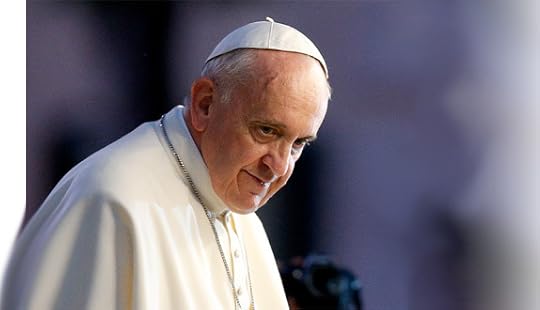
Pope
Francis: The Good, the Baffling, and the Unclear | Carl E. Olson | CWR Editorial
Recent
comments by the Holy Father, especially in interviews, are lacking in
three important things
"Nonetheless,
Lombardi stopped short of saying that every line was literally as
pronounced by the pope, suggesting instead that it represents a new
genre of papal speech that’s deliberately informal and not
concerned with precision." —
John Allen, Jr., reporting
today that journalist Eugenio Scalfari's Oct. 2nd interview with
Pope Francis was not recorded, but was the product of "an
after-the-fact reconstruction".
The
19th-century controversialist William G. Ward, a convert from
Anglicanism and a vigorous defender of all things Catholic, once
exclaimed, "I should like a new Papal Bull every morning with my
Times at breakfast." Since weekly papal interviews were not yet
a common occurrence in the 1860s, it's not clear if Ward, were he
among us today, would accept papal interviews in lieu of the somewhat
more authoritative papal bulls.
A
sense of humor and a sense of perspective are both helpful when
pondering the recent interviews given by Pope Francis. For those who
might be ready to jump off the edge of their Catechism of the
Catholic Church into the cold darkness of either cynicism or despair,
just consider how turbulent things would have been if the internet
had been around during the Avignon papacy. Even worse, imagine if
Twitter, Facebook, and Andrew Sullivan had been around during that
infamous (but little discussed) period sometimes called "the
Pornocracy"—a stretch of six decades or so in the
tenth century that witnessed about as much mortal sin, nepotism, and
abuse of power as the papacy could handle.
If
that seems like an overly extreme historical reference, you may have
missed how some are saying, with obvious glee, that Francis is unlike
any previous pontiff and is set to remake the papacy and the Catholic
Church in ways that eyes have not seen and ears have not heard
before. You may have also missed how others are saying, with obvious
distress, that Francis is unlike any previous pontiff and is set to
remake the papacy and the Catholic Church in ways—well, you get the
picture. There are also those who are, with the best of intentions,
insisting that nearly all of the hysteria, furor, and meta-narratives
are completely missing that Francis is both a surprising breath of
fresh air and an often misunderstood man who desires nothing more
than a Church radically committed to Jesus Christ and living the
Gospel with a profound spirit of evangelical fervor. The
oft-expressed hope that the Pope can unite and bring all men of good
will together is apparently being realized, albeit in a unity based
in countless arguments over what Francis really says, means, and
intends.
For
my part (and I'm hardly alone here, I'm certain), I reject the first
two options and agree in part with the third, with some important
qualifiers. Let's begin with the Good:
October 4, 2013
The Pope's Chat With an Atheist
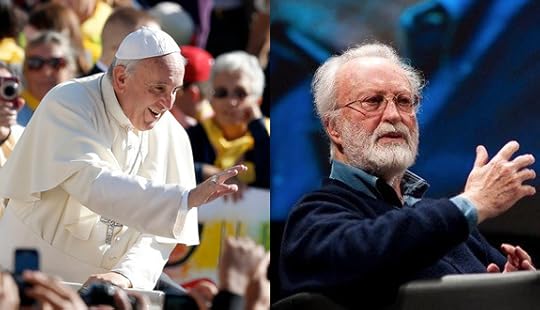
The Pope's Chat With an Atheist | Fr. James V. Schall, S.J. | Catholic World Report
The recent "La Repubblica" interview with Francis touches on many topics, not always with clarity or precision
“St. Paul is the one who
laid down the cornerstone of our religion and our creed. You cannot
be a conscious Christian without St. Paul. He translated the
teachings of Christ into a doctrinal structure that, even with the
addition of a vast number of thinkers, theologians and pastors has
resisted (change?) and still exists after two thousand years. Then
there are Augustine, Benedict, and Thomas, and Ignatius. Naturally
Francis. Do I need to explain why?”
— Pope Francis, Interview
with Eugenio Scalfari, La Repubblica, Rome, October 1, 2013.
I.
Pope Francis seems to be churning out interviews, phone calls,
letters, audiences, homilies, and encyclicals—along with official
business—faster than most of us can keep track of. Hardly had the
dust settled from discussions on his interview with La Civilta
Cattolica than a second interview appeared in the Italian
newspaper La Repubblica. This second interview was with the
founder of the newspaper, Eugenio
Scalfari, a well-known philosopher
and figure in Rome, one who tells us that he is not a believer,
though he was once baptized, made his first communion, and even went
on an Ignatian long retreat under the Jesuits.
By now,
we have seen, read, or listened to the new Pope enough to have gained
some perspective on what he is saying. Everyone acknowledges that he
has a knack for drawing attention to himself. His criticism of
Vatican “clericalism” falls into the “man bites dog” category
of newspaper headlines. His style of life and ways of getting around
are by now well known—the bus, the inexpensive automobile, the bare
room, the dislike of ceremony. We see him constantly reaching out to
people; he wants to touch them, talk to them. He seems impatient with
the limits of the human condition. We know his economics on poverty,
his politics of no war is good, and his unwillingness to judge. He
wants everyone to be a missionary and worries that the children in
Buenos Aires do not know how to make the Sign of the Cross.
This
second interview is a chatty one. It resulted from the Pope
responding to a letter from Scalfari. In fact, Francis just called up
Scalfari's office and made an appointment for the journalist to
visit him in his quarters in the Casa Santa Marta. While the two were
not old friends, their conversation was relaxed and frank. In words
that have reverberated around the world, the Pope told Scalfari that
the two most “serious” problems in the world are youth
unemployment and loneliness of the old. Scalfari tells the Pope that
these are really “political, and economic problems for states,
governments, political parties, and trade unions.” The social
doctrine of the Church has long stressed that it has no competence in
these matters. The Pope admits this but says that we must be
concerned with such problems. He adds that there are other problems
but such are the “most urgent” ones. But exactly what the Pope’s
economic and political theory would be to solve the problems of youth
unemployment and old age is never really addressed.
The
conversation begins with a jocular exchange about who is “converting”
whom. Scalfari suggests he is not convertible.
October 3, 2013
Saint Francis and the Imitation of Christ

Saint Francis and the Imitation of Christ | Ivan Gobry |
From Saint Francis of Assisi: A Biography
The sentiment that would carry Francis away and govern the founding of his
religious order was, from the very first moment of his conversion, a delirious
love for Christ. Not a contemplative love, which is satisfied with a
perceptible, mental vision of the Savior, which dwells at length upon his words
and his sufferings, but rather an active love. Of course, Francis habitually
possessed that contemplative fervor, too, as all of his biographers assure us.
Bonaventure writes: "He devoted such an ardent love to Christ, and his
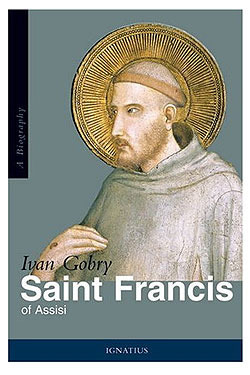
Beloved showed him in exchange such a familiar tenderness, that the servant of
God had almost continually before his eyes the physical presence of his
Savior."
And we find, in one of his prayers, the accents of all the great mystics:
"Lord, I beg thee, let the burning, gentle power of thy love consume my
soul and draw it far from everything that is under heaven, so that I may die
for love of thy love, O thou who hast deigned to die for love of my love."
Furthermore, this is the desire that he expresses for Christians in general, in
a sort of "encyclical letter" that he wrote entitled, "Letter to
All the Faithful". To those who truly love Christ, he promises that they
will be his spouses, his brethren, and his mothers:
We are spouses when the faithful soul is united to Jesus Christ through the
Holy Spirit. We are his brethren when we do the will of his Father who is in
heaven. We are his mothers when we bear him in our hearts and in our bodies
through our love, through the purity and fidelity of our conscience, and when
we give birth to him by the performance of good deeds, which should be a light
and an example for others. Oh, how glorious and holy it is to have such a
Father in heaven! Oh, how holy, beautiful and amiable it is to have a Spouse in
the heavens! Oh, how holy and precious, pleasing and humble, peaceful and
sweet, lovable and desirable a thing it is, surpassing all else, to have such a
Brother!
We find the same accents in the writings of Clare, the perfect disciple of
Francis, for instance, in a letter to Agnes of Bohemia, who had become the
abbess of the convent in Prague:
Happy indeed is she to whom this is granted a place at the divine banquet, for
she can cling with all her heart to him whose beauty eternally awes the blessed
hosts of heaven; to him whose love gladdens, the contemplation of whom
refreshes, whose generosity satisfies, whose gentleness delights, whose memory
shines sweetly as the dawn; to him whose fragrance revives the dead, and whose
glorious vision will render all the inhabitants of the heavenly Jerusalem
blessed.
The 1221 rule had enshrined in its text the duty to belong to Jesus Christ:
Let us not desire anything else, let us not want anything else, let nothing
please us or give us joy except our Creator, Redeemer, and Savior, the one true
God, who is the fullness of Good, the complete and total Good, the venerable
and supreme Good, who alone is good, merciful and kind; who alone is just,
truthful and right; who alone is beneficent, innocent and pure; from whom,
through whom, and in whom is found all pardon, all grace, all glory for the
repentant and the just, and for all the blessed who rejoice with him in heaven.
With Christ, Francis could give free rein to his poetic sensibility. But poetry
is not good form in a canonical document, and so that exhortation was deleted
from the definitive rule.
Now the love of Christ compels the soul and draws it into a service which is
preferential, exclusive, and unconditional. Saint Bonaventure could write,
"One word sums up all of Francis: faithful servant of Christ." As a
servant, he was entirely subject to his master, as called for in the prayer
that concludes his "Letter to the General Chapter":
Almighty and ever-living God, just and merciful Lord, grant to us miserable
creatures, for your own sake, that we may know what you will, and that we may
always will what pleases you; so that, externally purified and illumined within
and inflamed with the fire of the Holy Spirit, we may follow in the footsteps
of your dearly beloved Son, our Lord Jesus Christ, and by your grace alone may
arrive at our destination in you, O Most High, who in perfect Trinity and
utterly simple Unity live and reign and are glorified, Almighty God, unto ages
of ages. Amen.
To follow Christ is not only to serve him, it is not enough to do his will; it
also means becoming like him. This love is a love that consists not only in
doing, but in being; a love that thrives not only in activity but in the
person. Francis, without having read the Fathers of the Church, follows their
teaching in this: Origen, Athanasius, and Gregory of Nyssa demonstrate how the
Son is the mediator of the Father: God created man in his image, in a state of
perfection; original sin corrupted that image, and the Son, who is the perfect
image of the Father, came both to reveal God to us and to teach us the way
leading to the restoration of his image in us. Saint Francis adds, however, an
original thought to this doctrine about creation: God the Father created us in
his image with respect to our souls, and in the image of his Son, the Incarnate
Word, with respect to our bodies.






The Friar Minor is someone who must put on Jesus Christ. The first rule states
this explicitly: "The rule and the life of the Friars Minor consists of
living in obedience, in chastity and without owning anything, by following the
teaching and example of our Lord Jesus Christ." It adds, in the concluding
admonition, "Our Lord Jesus Christ, in whose footsteps we must follow. . .
Now, Saint Francis himself is not content to call on his brothers in his rule
and in his exhortations to imitate Jesus Christ: he proves himself to be his
most fervent imitator. So much so that Saint Bonaventure, in the prologue of
his biography, considers this fact an essential component of his master's
personality:
To all true lovers of humility and holy poverty, the grace of God our Savior
has manifested itself in these latter days in the person of Francis, his servant,
so that his example might present for their veneration the surpassing mercy of
God in his regard, and might teach them to renounce once and for all the
impiousness and covetousness of this world, to conform their lives to the life
of Christ, and to yearn with an incomprehensible longing for Christ, our
blessed hope.
Thus Francis calls his disciples to imitate Jesus Christ, and the disciples
find in him the example of imitating the Divine Model. This is precisely the
theme of the wonderful anonymous work composed by the friars who were closest
to Saint Francis, The Mirror of Perfection. One of the chapters candidly declares, "Francis, faithful
servant and perfect imitator of Christ, felt that he had been completely
transformed into Christ .
And it concludes as follows: "Thus, having spent twenty years in perfect
repentance, on October 4 in the year of the Lord 1226, Francis passed on to the
Lord Jesus Christ, whom he had loved with all his heart, with all his mind,
with all his soul, with all his strength, with the most ardent desire and most
lively affection, following him to complete perfection, running eagerly in his
footsteps, and arriving at last in his glorious presence."
Francis claims to imitate Jesus Christ more especially in his lowliness and his
suffering. This is the subject of one of his admonitions: "Let all the
friars consider the Good Shepherd who suffered death on the Cross for the
salvation of his flock. The Lord's sheep have followed him in trials,
persecution, and humiliation, in hunger and thirst, in weakness, hardships, and
all other sorts of misfortunes."
According to The Three Companions,
a devotion to the Passion of Christ was engraved on his soul at that moment in
the ruined church of San Damiano when the Crucified Lord spoke to him.
"From that day on, his heart was so struck and so profoundly wrenched by
the memory of the Lord's Passion that, throughout the rest of his life, he harbored
in his soul the memory of the wounds of the Lord Jesus."
He had composed an office of the Passion, along with a "prayer for times
of sickness", which has come down to us: "I give you thanks. Lord
God, for all my pains, and I ask you, my Lord, to send me a hundred times as
many, if such is your good pleasure. For I would very willingly accept it if
you did not spare me but overwhelmed me with pain, since my submission to your
holy will is for me a surpassing consolation."
And so the mystical gift of the stigmata was the answer to this thirst for a
practical union with the sufferings of Christ. A few moments before receiving
it, he was praying to the Savior in these words: "Lord, I ask you for two
graces before I die: to experience in myself. as much as possible, the
sufferings of your cruel Passion, and to feel for you the same love that drove
you to sacrifice yourself for us."
Celano reckons that the manifest sanctity of Francis was the result of the
martyrdom that he received, not at the hands of the Muslims. as he had hoped at
first, but through the intervention of God himself "His perfection equaled
that of the saints who had gone before him, but his life shone with still
greater brilliance. For our glorious father was marked, in five places on his
body, with the seal of the Passion and of the Cross, as though he had been
crucified with the Son of God."
We find the same remark in the writings of Saint Bonaventure: "In order to
arrive at the firm conviction that Francis, this messenger sent by the love of
Christ for us to imitate, is the servant of God, it is enough to contemplate
that perfection in his sanctity whereby he merited that he should be presented
as a model for the perfect disciples of Christ. And what assures us of this is
the irrefutable proof the seal that made him into an image of the living God,
Jesus crucified."
Love for Christ leads to love of the Eucharist--the living Christ offering
himself on the altar for our salvation and reserved among us for our adoration.
Francis left behind an exhortation on the Body of Christ that displays flawless
doctrinal knowledge of this mystery:
Every day the Son of God comes to us under humble appearances; every day he
descends upon the altar through the hands of the priest. And just as he
revealed himself to the apostles in truly human flesh, so too he reveals
himself to us now in the consecrated bread. They, when they looked upon him
with their fleshly eyes, saw only his flesh, but because they contemplated him
with their spiritual eyes, they believed that he was God. May we, too, when we
see with our fleshly eyes the bread and wine, be able to see and believe most
firmly that they are the most sacred Body and Blood of the living, true Lord.
This, indeed, is the manner that he has chosen to remain always with those who
believe in him, as he himself said: "Behold, I am with you until the
consummation of the world."
In his "Letter to All the Faithful", Francis recalls the institution
of the Eucharist and repeats the first words of the formula of
transubstantiation. Then he comments: "The Son of the Father wants us all
to be saved by him, and to receive him with a pure heart into a chaste body
.... We must confess to the priest all our sins and receive from him the Body
and Blood of our Lord. Anyone who does not eat his flesh and drink his blood
cannot enter into the Kingdom of heaven."
At that time, the Church had not enacted very precise regulations for showing
respect for the Eucharist, in particular for conserving the consecrated species,
which were often left at random in some corner of a church or an oratory. Saint
Francis denounced this scandal and urged clerics, his contemporaries, to
venerate continually the Real Presence of God under the appearance of Bread.
The Legenda antiqua relates that
Blessed Francis had a great respect and a profound devotion for the Body of
Christ. That is why he had it written in the rule that the friars should
surround the Eucharist with great care and a lively solicitude in the provinces
where they were staying, exhorting and encouraging the clerics and priests to
reserve the Body of Christ in a decent, suitable place; and that if they did
not do so, the friars should do it in their stead. Nay, much more, he insisted
on sending into the provinces friars who brought with them ciboria in which to
reserve the Body of Christ.
We find an echo of this preoccupation in the "Letter to All Clerics on the
Respect Due to the Body of the Lord". He calls to the attention of all the
clerics who habitually surround the altar the sad state of the liturgical
furnishings: chalices, corporals, altar linens; he notes that "many leave
the Eucharist haphazardly, in dirty places, carry it through the streets
unworthily and administer it indiscriminately." He, who was only a lowly
deacon, ordered those to whom the letter was addressed that, wherever they
found the Body of Christ in an unsuitable place, they should respectfully take
it and find for it worthy place. And then he allows his indignation to erupt:
"And ye: all these profanations do not move us to pity! Even though our
Lord. in his goodness, abandons himself into our hands, and we hold him and our
mouths receive him every day! Are we unaware of the fact that one day we must
fall into his hands?"
In his "Letter to the General Chapter", the protestations give way to
praise:
Let mankind be seized with fear, the whole world should tremble and heaven
rejoice, when Christ the Son of the living God is present on the altar in the
hands of the priest! O wondrous majesty! O stupendous dignity! O sublime
humility! O humble sublimity! That the Lord of the whole universe, God and the
Son of God, should humble himself to the point where he hides under the form of
a little bread, for our salvation. But you should keep nothing for yourselves,
so that he who has given himself entirely to you may receive you entirely.
In another letter, "To the Rulers of the People", addressed to
"magistrates, consuls, judges, and governors", Francis exhorts his
readers, first, not to forget that the day of death is approaching, and that
one must prepare for it by keeping the commandments, and second, to receive the
Eucharist and to show great reverence for it.
His "Letter to All Superiors of the Friars Minor", on the other band,
takes up again the admonition that he addressed to the clerics concerning the
Eucharist: "Ask the clergy with all humility to venerate above all the
most sacred Body and Blood of our Lord Jesus Christ, together with his holy
name and the writings which contain his words, those words which consecrate his
Body." Furthermore he recalls the duty of all clerics to keep the Body of
the Lord carefully reserved in a tabernacle, to administer it with discernment,
and to remind the faithful in their sermons to receive Communion worthily.
Related IgnatiusInsight.com Excerpts and Articles
• St. Thomas and St. Francis | G.K. Chesterton
• Chesterton and Saint Francis | Joseph Pearce
• Seeking Deep Conversion | Fr. Thomas Dubay, S.M.
• Catholic Spirituality | Thomas Howard
• The Scriptural Roots of St. Augustine's Spirituality | Stephen N. Filippo
• The Eucharist: Source and Summit of Christian Spirituality | Mark Brumley
• Blessed Columba Marmion: A Deadly Serious
Spiritual Writer | Christopher Zehnder
• The Religion of Jesus | Blessed Columba Marmion
20% off New Fall Titles. Attend premiere of "Mary of Nazareth" in San Francisco
20% off New Fall Titles!

Don't miss the San Francisco Mary of Nazareth premiere,
and a chance to meet the star of the film, Alissa Young,
and Ignatius Press author, Father Calloway!
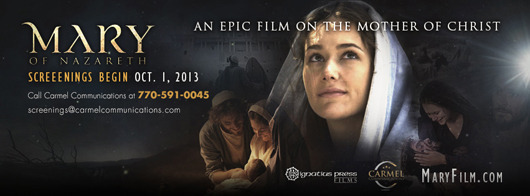
Dear Friends of Ignatius Press,
We are thrilled to announce that the premiere of MARY OF NAZARETH will be in San Francisco on Friday, October 11, 2013. MARY OF NAZARETH is Ignatius Press’ newest feature film on the life of Mary, Mother of Christ, from her childhood through the Resurrection of Jesus. The film is being released this month in a sponsored theatrical screening program similar to Restless Heart.
To launch these screenings, which will take place across North America, we invite you to the premiere of the film at the AMC Metreon 16 in San Francisco on October 11. Tickets must be pre-purchased online.
Fr. Donald Calloway and actress Alissa Jung, who plays Mary in the film, will be present at this event.
Join us for the premiere of MARY OF NAZARETH on Friday, October 11. Click here to purchase tickets.
The doors open at 6:30 p.m. and the movie starts at 7:00 p.m. after a brief introduction from Fr. Donald Calloway, MIC. After the movie, there will be a Q & A and an opportunity to take pictures with Fr. Calloway and German actress Alissa Jung.

This feature film shot in English and High Definition was filmed in Europe in authentic locales with outstanding cinematography, a strong cast, and a majestic music score. Actress Alissa Jung gives a compelling and inspired portrayal of Mary. The film vividly captures the essence of Mary’s profound faith and trust in God amidst the great mysteries that she lived with as the Mother of the Messiah.
To see a sneak peak click here.
Fr. Donald Calloway says, “ MARY OF NAZARETH is an absolute theological and Mariological masterpiece! It will make you want to love her more than ever. Mary’s beauty is pure and ageless and her divine motherhood is both tender and captivating. Without a doubt, this is the most stunning portrayal of the Virgin Mary on film!”

SALE
Offer ends Wednesday October 9th, 2013 at 12:00 midnight EST.
These prices are available online only through Ignatius.com
20% off Great New Titles from Ignatius Press!
New Books
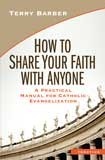 How to Share Your Faith with Anyone
How to Share Your Faith with Anyone
A Practical Manual of Catholic Evangelization
Terry Barber
Recent popes have challenged all Catholics to participate in the New Evangelization. But most Catholics feel ill-equipped to take up the challenge. Terry Barber, founder of St. Joseph Communications, has written a practical guide that takes much of the pain and uncertainty out of sharing one's faith. Based on Barber's decades of personal experience as an effective evangelist and masterful communicator, and drawing on the perceptions, examples, and lessons of other great evangelists and apologists, How to Share Your Faith with Anyone informs, entertains, and inspires would-be, as well as, seasoned evangelists and teachers. Also available as an e-book. Regular price: $14.95, sale price: $11.96
"Terry Barber has long been one of the Church's finest evangelists. His excellent book shows us how the new evangelization requires new apologetics - a new way to explain why the Church's teachings are true and why Jesus is the answer to the deep desires of the human heart." - Most Reverend Jose Gomez, Archbishop of Los Angeles
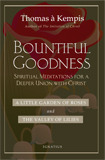 Bountiful Goodness
Bountiful Goodness
Spiritual Meditations for a Deeper Union with Christ
Thomas à Kempis
The Imitation of Christ, also by Thomas À Kempis, is the most famous and beloved Christian devotional ever written. The simplicity, piety and wisdom that readers have found in that classic will also be discovered in these new modern-English translations of A Little Garden of Roses and The Valley of Lilies. The aim of these works is to draw the reader to a closer union with Jesus. While Imitation sets forth the principles of discipleship, the two works in this volume offer more practical advice. They treat of the virtues needed to advance toward God. Also available as an e-book. Regular price: $14.95, sale price: $11.96
New Films
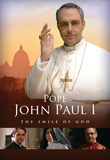 Pope John Paul I: The Smile of God
Pope John Paul I: The Smile of God
This movie captures not only the significance of his John Paul I's papacy, but also tells the story of his whole life leading up to his papacy, a life marked by deep faith and heroic charity. It shows how his life of great dedication to the church and the needs of all his flock prepared him well for his election to the papacy. It reveals that he was a protégé of Pope John XXIII, who saw greatness and genuine holiness in him, and made Luciani an Archbishop and the Patriarch of Venice. He was a man of peasant origins, a devoted parish priest with a great love for orphans, the poor and outcasts, a priest who had a reluctant rise to become a prince of the Church. Regular price: $19.95, sale price: $15.96
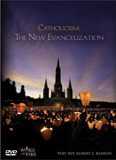 Catholicism: The New Evangelization
Catholicism: The New Evangelization
This new documentary series from Fr. Robert Barron continues the story of his major Catholicism series and explores the Church's mission and the challenges of contemporary culture. With the original Catholicism series, Fr. Barron took us on a journey around the world deep into the Faith. Now, experience this Faith in action in Catholicism: The New Evangelization. This film tells us what the "New Evangelization" is and then takes us on a fascinating tour to witness examples of new ardor, new expressions and new methods of evangelization in action. Regular price: $59.95, sale price: $47.96
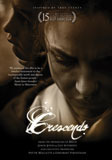 Crescendo
Crescendo
In this multi-award-winning short film, we look into the soul of a German woman whose life in the 18th Century is filled with discordant notes and driven by domestic hardships. Based on an amazing true story, told with beautiful poignancy, "Crescendo" is packed with powerful performances, exquisite imagery and brilliant music. A life-affirming short film by the makers of Bella, with a special introduction by Pattie Mallette, mother of Justin Bieber. Regular price: $14.95, sale price: $11.96
 Saint Maria Goretti: Fourteen Flowers of Pardon
Saint Maria Goretti: Fourteen Flowers of Pardon
Shot on location in Italy, this moving account takes you on a historic and poignant journey through the life, martyrdom and canonization of the Roman Catholic Church's youngest saint, Maria Goretti. Maria's life and martyrdom in Italy's Pontine swamps at the beginning of this century comes to life through historic photographs, interviews with the saint s mother and never seen before film footage of the canonization ceremony. Regular price: $19.95, sale price: $15.96
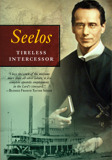 Seelos: Tireless Intercessor
Seelos: Tireless Intercessor
Seelos: Tireless Intercessor is the true story that chronicles the heroic and miraculous life of a young immigrant priest, Blessed Francis Xavier Seelos (1819-1867). This Redemptorist missionary was beatified by Pope John Paul II in the Solemn Jubilee Year 2000.
Father Seelos possessed great mystical gifts due to his intense prayer life. His dedication to ministry with cheerful holiness makes him still an outstanding model for clergy, religious, and laity alike. As an itinerant preacher and lifelong friend of the poor and destitute, Seelos was a spiritual Father to tens of thousands. Despite his early death at age 48, so profound was his missionary zeal that sickness, persecution, and even the upheaval caused by the Civil War, could not stop him. Regular price: $19.95, sale price: $15.96
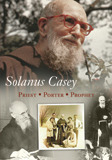 Solanus Casey: Priest, Porter, Prophet
Solanus Casey: Priest, Porter, Prophet
This extraordinary film explores the heroic life of a remarkable, modernday mystic, Father Solanus Casey, who was relegated to doing little more than being a simple doorman in his monastery. But God would transform the role his superiors assigned him, appointing it a far greater significance to be continued even beyond his earthly life, that of prophet, healer, and intercessor.
A gripping story of this priest's simple and unshakable faith in God's goodness unfolds through interviews with his friends, colleagues, eyewitnesses, biographers, and those direct recipients of his healing and prophecy. Rare, never-before-seen film footage and historical photographs are included with actual footage from the exhumation of this exemplary Servant of God. Regular price: $19.95, sale price: $15.96
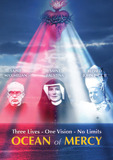 Ocean of Mercy
Ocean of Mercy
At the dawn of the 20th century, three voices rose up from Poland to proclaim an urgent message, a message powerful enough to alter the course of an age plunging into spiritual darkness.
Filmed on location in more than 20 cities across Poland and the United States, this true story examines and chronicles the phenomenal lives and spiritual legacy of Saint Faustina Kowalksa, Saint Maximilian Kolbe, and Blessed John Paul II, modern day "Apostles of Mercy".
Through never before seen film footage, rare photographs, and extensive interviews with friends, biographers, and family members, this story journeys across a dramatic visual landscape to document their heroic struggle and herald the message of Divine Mercy to all mankind. Regular price: $19.95, sale price: $15.96
New Music
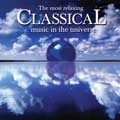 The Most Relaxing Classical Music in the Universe
The Most Relaxing Classical Music in the Universe
This 2-CD set features two hours of some of the most beloved classical pieces of all time, music to help soothe the soul amidst today's hectic culture. It offers 30 timeless pieces by Mozart, Bach, Handel, Beethoven, Debussey and more, including Canon in D, Clair De Lune, Air on a G String, Ave Maria, Moonlight Sonata, The Four Seasons and much more! Regular price: $16.95, sale price: $13.56
Catholic World Report
Helping Others Fall in Love with God
By Jim Graves
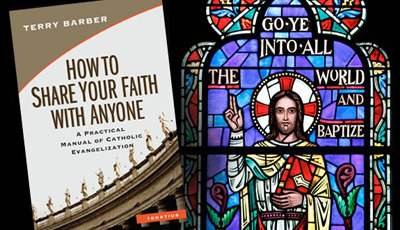
Terry Barber talks about evangelization, the purpose of life, and why many Catholics live as if God doesn't exist.
Terry Barber, 56, grew up in the Los Angeles area, and enjoyed a successful career in real estate. In fact, by age 25, he’d acquired enough property to comfortably retire. So, he decided he’d focus on a new career: working with other Catholic apologists to win souls for Christ.
He founded a variety of Catholic evangelization apostolates, including St. Joseph Communications and the Catholic Resource Center, and serves as Chairman of the Board of Lighthouse Media. He is also the co-host of The Jesse & Terry Show, a Catholic apologetics radio program he does with Jesse Romero and which airs on 300 radio stations nationwide ...
Homiletic & Pastoral Review
Jesuitizing the Church: Under Francis, Would That Be So Bad?
By Fr. David M. Knight
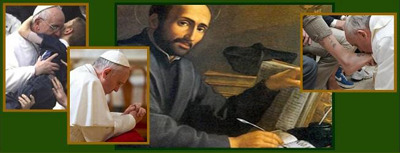
Francis has made this strategy the most visible difference in the lifestyle he has adopted as Bishop of Rome … rejecting … the “riches and honors” that, over the centuries, have attached themselves to the papal office like barnacles to an unkempt ship.
The word “Jesuit” does not reassure. Its second dictionary meaning is “a crafty schemer, cunning dissembler, casuist … who deliberately uses words to deceive others.”
In fairness, “Jesuit” should stand for persons or practices that follow the principles of St. Ignatius of Loyola, who founded the Jesuit order in 1534. What are those principles, and what is their relevance for the Church today, now that a Jesuit is Bishop of Rome? Especially, as Pope Francis has said, “I feel like I’m still a Jesuit in terms of my spirituality, what I have in my heart. … Also, I think like a Jesuit” (airplane interview returning from Rio de Janeiro, 2013)...
Copyright © 2013 Ignatius Press, All rights reserved.
Interviews with Card. Marc Ouellet offer insight into the Second Vatican Council
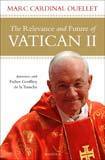 in the new book
The Future and Relevance of Vatican II
, Cardinal Ouellet speaks both personally and professionally about the state of the Church since the Council. He explains in these interviews what went wrong – and right – in the implementation of the Council’s teachings.
in the new book
The Future and Relevance of Vatican II
, Cardinal Ouellet speaks both personally and professionally about the state of the Church since the Council. He explains in these interviews what went wrong – and right – in the implementation of the Council’s teachings.Ouellet discusses his own life, including his childhood in post-colonial Quebec, the search for meaning leading to his personal encounter with Christ, his vocation to the priesthood, being a professor in Latin America and Rome, and his more recent positions as archbishop of Quebec, prefect of the Congregation for Bishops, and president of the Pontifical Commission for Latin America. Drawing on his experience as both a formator of priests and a professor at the John Paul II Institute for the Family, Ouellet speaks of the significance of married love, the meaning of consecrated life, and the spousal nature of the priesthood. He illuminates these realities with the teachings of the Council. Among other topics, the Cardinal discusses his acquaintance with popes John Paul II and Benedict XVI, his experience on the Pontifical Council for Christian Unity, and his admiration for the youth today.
The interview continues with questions about the Council’s four Constitutions and the Council in general, leading to a discussion of a wide range of topics including liturgy, ecumenism, evangelization, the work of the laity, new movements and communities, vocations, celibacy, human dignity, war and justice, ecology, sin, and the Eucharist. Moving with clarity and ease between theological realities and personal impressions, Cardinal Ouellet discusses the state of the Church today with points that are challenging, edifying, and full of hope.
Cardinal Marc Ouellet is the prefect of the Congregation for Bishops and also president of the Pontifical Commission for Latin America. He was ordained in 1968 and is a priest of the Society of Saint-Suplice. After serving over 20 years as a university and seminary professor, he was appointed Archbishop of Quebec in 2002 and created cardinal by Pope John Paul II.
Fr. Geoffroy de la Tousche was ordained in 1998 and is a priest of the Diocese of Rouen, France. In 2002, he completed a doctorate in dogmatic theology at the Pontifical Gregorian University on the subject of bishops as addressed in the Vatican II Constitution Lumen Gentium.
Mark Brumley, the President of Ignatius Press, is available for interviews about this book. To request a review copy or an interview with Mark Brumley, please contact: Rose Trabbic, Publicist, Ignatius Press at (239) 867-4180 or rose@ignatius.com
More about the book:
The Relevance and Future of the Second Vatican Council
by Marc Cardinal Ouellet
• Also available in Electronic Book Format
Fifty years after the opening of the Second Vatican Council, Cardinal
Marc Ouellet-considered by many to have been a top candidate to succeed
Pope Benedict XVI-gives his thoughts on the Council and what the
Vatican II means for us today. In interviews with French priest Fr.
Geoffroy de la Tousche, Cardinal Ouellet speaks both personally and
professionally about the state of the Church since the Council,
explaining what went wrong-and right-in the implementation of the
Council's teachings.
Ouellet discusses his own life, including his childhood in post-colonial
Quebec, the search for meaning leading to his personal encounter with
Christ, his vocation to the priesthood, being a professor in Latin
America and Rome, and his more recent positions as archbishop of Quebec,
prefect of the Congregation for Bishops, and president of the
Pontifical Commission for Latin America. Drawing on his experience as
both a formator of priests and a professor at the John Paul II Institute
for the Family, Ouellet speaks of the significance of married love, the
meaning of consecrated life, and the spousal nature of the priesthood.
He illuminates these realities with the teachings of the Council. Among
other topics, the Cardinal discusses his acquaintance with popes John
Paul II and Benedict XVI, his experience on the Pontifical Council for
Christian Unity, and his admiration for the youth today.
The interview continues with questions about the Council's four
Constitutions and the Council in general, leading to a discussion of a
wide range of topics including liturgy, ecumenism, evangelization, the
work of the laity, new movements and communities, vocations, celibacy,
human dignity, war and justice, ecology, sin, and the Eucharist. Moving
with clarity and ease between theological realities and personal
impressions, Cardinal Ouellet discusses the state of the Church today
with points that are challenging, edifying, and full of hope.
Cardinal Marc Ouellet is the prefect of the
Congregation for Bishops and also president of the Pontifical Commission
for Latin America. He was ordained in 1968 and is a priest of the
Society of Saint-Suplice. After serving over 20 years as a university
and seminary professor, he was appointed Archbishop of Quebec in 2002
and created cardinal by Pope John Paul II.
Fr. Geoffroy de la Tousche was ordained in 1998 and
is a priest of the Diocese of Rouen, France. In 2002, he completed a
doctorate in dogmatic theology at the Pontifical Gregorian University on
the subject of bishops as addressed in the Vatican II Constitution Lumen Gentium.
October 2, 2013
Helping Others Fall in Love with God
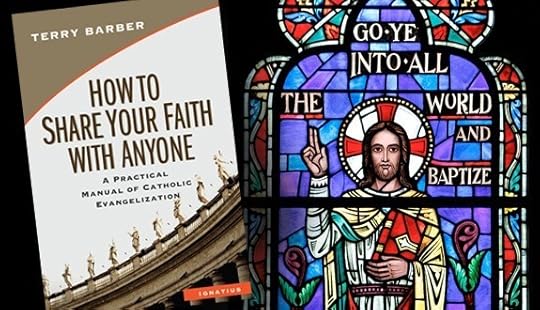
Helping Others Fall in Love with God | Jim Graves | CWR
Terry Barber talks about evangelization, the purpose of life, and why many Catholics live as if God doesn't exist.
Terry Barber, 56, grew up in the Los Angeles
area, and enjoyed a successful career in real estate. In fact, by age 25,
he’d acquired enough property to comfortably retire. So, he decided he’d
focus on a new career: working with other Catholic apologists to win souls for
Christ.
He founded a variety of Catholic evangelization
apostolates, including St. Joseph Communications
and the Catholic Resource
Center, and serves as Chairman of the Board of Lighthouse Media. He
is also the co-host of The Jesse &
Terry Show, a Catholic apologetics radio program he does with Jesse Romero and
which airs on 300 radio stations nationwide.
Barber's “one and only” book on Catholic
evangelization, How
to Share Your Faith with Anyone: A Practical Manual of Catholic Evangelization, has just been published by Ignatius Press.
Drawing heavily on personal stories from his lifetime of Catholic evangelism,
Barber offers tips to the average layman on how he might help win souls for
Christ.[image error]Continue reading at www.CatholicWorldReport.com.
Carl E. Olson's Blog
- Carl E. Olson's profile
- 20 followers



